by Admin
14/03/2025
Armenia and Azerbaijan announced on Thursday that they have reached an agreement to sign a peace treaty aimed at ending decades of conflict between the two nations.
In a major concession, Armenia has agreed to relinquish its territorial claim over the predominantly Armenian-populated Karabakh region.
A move that could pave the way for lasting normalization between these longtime adversaries.
The proposed treaty, which both countries described as a compromise after years of stalled negotiations, comes amid intense regional rivalry where global powers like Russia, the European Union, the United States, and Turkey, in which each major player seeks to extend their influence.
The two countries have had a long history of conflict, having fought wars over Karabakh at the end of the Soviet era and again in 2020.
Most recently, Azerbaijan launched a swift 24-hour offensive in September 2023 to seize full control of the region.
Jeyhun Bayramov, Azerbaijani Foreign Minister, confirmed that the talks had concluded and noted that Armenia accepted Azerbaijan’s proposals on the two previously disputed sections of the draft treaty.
In a follow-up statement, Armenia’s foreign ministry confirmed that negotiations were complete and declared that the peace agreement is now ready for signing.
Nikol Pashinyan, the Armenian Prime Minister, hailed the development as an “important event” and indicated that discussions over the time and venue for the signing would begin shortly.
The peace agreement between the two countries was welcomed by International leaders. French President Emmanuel Macron welcomed the announcement, stating on social media that no significant obstacles now remain for the treaty’s signing, which he believes could usher in lasting peace in the South Caucasus.
However, Armenia expressed displeasure over Azerbaijan’s decision to issue a unilateral statement rather than a joint declaration.
Pashinyan’s acknowledgment of Baku’s sovereignty over Karabakh after more than three decades of separatist control marks a crucial step toward improved relations.
Notably, Armenia returned four border villages to Azerbaijan last year, following the displacement of over 100,000 ethnic Armenians from Karabakh after its capture by Azerbaijani forces.
Despite the overall progress, two major issues remain unresolved.
One pertains to the non-deployment of third-party military forces along the shared border, while the other involves plans for the mutual withdrawal of legal cases from international judicial bodies.
This dispute has seen both countries engaged in legal battles at forums such as the International Court of Justice and the International Criminal Court.
Additionally, Azerbaijan has indicated that its next demand from Armenia is to amend its constitution to remove any reference that asserts territorial claims over Karabakh.
A change that would necessitate a public referendum.
The tentative agreement represents a significant step forward, though its full implementation will depend on overcoming these outstanding issues and ensuring that all parties remain committed to a peaceful future.

